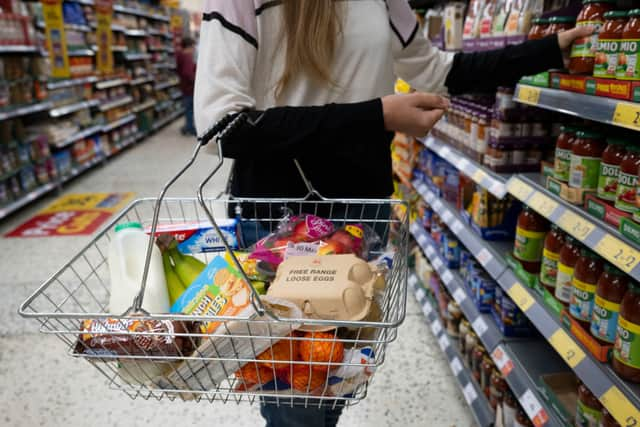UK inflation rate: May 2022 rate hits 9.1% in new 40-year high as cost of living crisis deepens
and live on Freeview channel 276
The rate of inflation increased again in May to a new 40-year high, latest figures show.
The rate of consumer prices index (CPI) inflation rose from 9% in April to 9.1% in May, the Office for National Statistics (ONS) has said, with the increase matching what analysts had expected.
Advertisement
Hide AdAdvertisement
Hide AdThe rise pushes the measure to its highest rate since early 1982, according to ONS estimates.


ONS chief economist Grant Fitzner said: “Though still at historically high levels, the annual inflation rate was little changed in May.
“Continued steep food price rises and record high petrol prices were offset by clothing costs rising by less than this time last year, and a drop in often fluctuating computer games prices.
“The price of goods leaving factories rose at their fastest rate in 45 years, driven by widespread food price rises, while the cost of raw materials leapt at their fastest rate on record.”
Advertisement
Hide AdAdvertisement
Hide AdWhat is inflation?
Inflation refers to the sustained rise in the prices of goods and services within a country over a set period of time.
Inflation rates vary all the time in response to external factors, such as the price of oil, which has risen recently as lockdown restrictions have been eased.
The ONS releases regular updates on the UK’s inflation rate for people to assess living costs and make changes.
As inflation rates increase so does the cost of living, meaning the value of currency decreases.
Advertisement
Hide AdAdvertisement
Hide AdWhy has inflation gone up?
The rate of inflation has increased largely because of the increase in food prices, which added more than 0.2 percentage points to the inflation number, the ONS said.
Meanwhile clothing and footwear prices helped to keep a lid on inflation, and recreation and culture prices also pulled it downwards.
The ONS added: "Rising prices for food and non-alcoholic beverages, compared with falls a year ago, resulted in the largest upward contribution."
The increase adds to the pressures already facing households across the UK after energy bills rose by 54% for the average home at the beginning of April, and forecasts predict costs will go up even higher later this year.
Advertisement
Hide AdAdvertisement
Hide AdEstimates released this week predict that the price cap on energy bills could increase by almost £1,000 from October.
It is expected that bills will rise from an already record high of £1,971 to £2,980 in the autumn.
Loading....
The Bank of England has also predicted that inflation will spike at more than 11% in October after the price cap is changed again.
But the price of energy is not just feeding through to household energy bills. Gas, oil and other fossil fuels are needed to make and transport many of the goods that households buy every month. So when the price of the fuel goes up, so does the price of the end product.
Advertisement
Hide AdAdvertisement
Hide AdEnergy prices have spiked over the last year and began rising as the global economy started to reopen and demand for energy rose after the pandemic.
Prices then increased further after Russia launched a full-scale invasion of Ukraine in February, as the country is one of the world’s largest energy producers.
Responding to the latest inflation figures, Chancellor Rishi Sunak said: “I know that people are worried about the rising cost of living, which is why we have taken targeted action to help families, getting £1,200 to the eight million most vulnerable households.
“We are using all the tools at our disposal to bring inflation down and combat rising prices – we can build a stronger economy through independent monetary policy, responsible fiscal policy which doesn’t add to inflationary pressures, and by boosting our long-term productivity and growth.”
Advertisement
Hide AdAdvertisement
Hide AdRising inflation and increasing energy costs prompted Mr Sunak to announce a £15 billion package of support last month.
Measures included a £400 energy bill discount for every household, plus a one-off £650 payment to more than eight million low-income households on benefits.
Eligible households are due to receive the first instalment of the £650 payment from next month.
Comment Guidelines
National World encourages reader discussion on our stories. User feedback, insights and back-and-forth exchanges add a rich layer of context to reporting. Please review our Community Guidelines before commenting.
